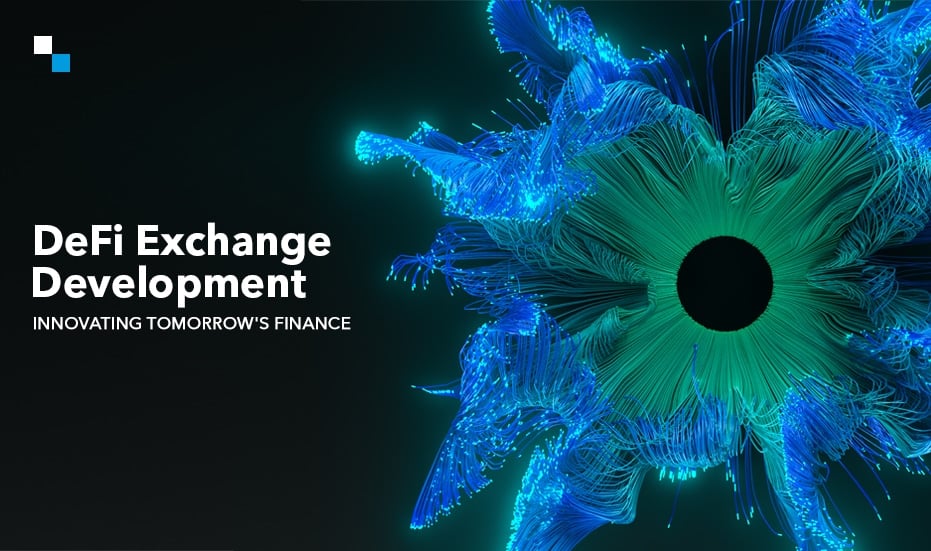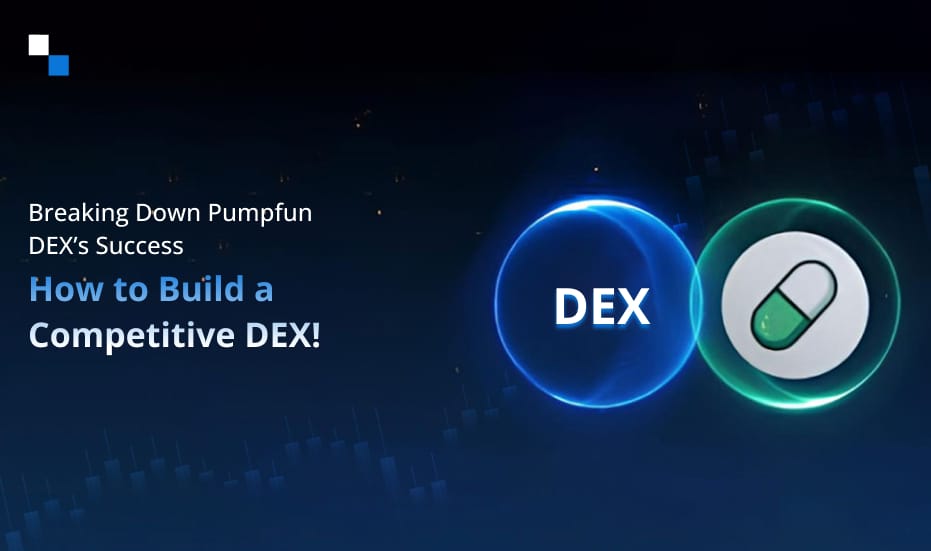
A Comprehensive Guide on Flash Loan Arbitrage Smart Contract in 2024
March 19, 2024
Most Profitable Play to Earn Mobile Games of 2024
March 20, 2024Table of Contents
- Decoding The Charms of DeFi
- Exploring DeFi Exchange Development
- Essential Concepts in DeFi Exchange Development
- Token Standards and Interoperability
- Ensuring Security with Decentralized Exchange Development Company
- Focus on User-Friendly Interface by a DEX Development Company
- Addressing Challenges in DeFi Exchange Development
- Wrapping Up
In traditional finance, intermediaries have long ruled the gates, governing the flow of wealth, resources, and opportunity. Yet a new frontier beckons, as blockchain brings the promise of emancipating trillions daily- placing all financing within reach of anyone through open access.
The global decentralized finance market is set to soar, showcasing a 45.36% CAGR during 2024-2031.
For those wanting to capitalize on rising public interest in DeFi, a DEX development company provides decentralized platforms to accelerate financial inclusion for both unbanked and crypto enthusiasts. DeFi exchange development consists of various elements wrapped up in jargon that are difficult for beginners to understand without some prior subject matter knowledge. This blog piece attempts to shed light on creating Next-Gen platforms that operate on an automated process, which shows the potential of wiping out traditional banks.
Decoding The Charms of DeFi
Traditional finance confines freedom in trading through barriers of intermediation, borders and biases, and centralized control. Bitcoin sparked a revolution by enabling direct transactions without third parties. Further disruption loomed with DEX platforms that offer:
- Access for All: A decentralized exchange development company utilizes innovative smart contracts and permissionless protocols to unlock the innate potential of global open-access finance.
- Money Lego: DeFi has been likened to building blocks you can stack to maximize value. With yield farming opportunities aplenty, users can mix and match protocols like pieces in a Lego set to tailor their investments based on personal goals.
- Security First: Decentralized exchanges minimize the risk of manipulation or breaches compared to centralized crypto exchanges (CCEs) by storing assets directly on the blockchain.
An experienced DEX development company builds customized software to optimize connectivity and participation with technology for financial liberation.
Exploring DeFi Exchange Development
DeFi exchange development is at the forefront of the shift, as DeFi has been gaining momentum.
What is DeFi Exchange Development?
It refers to the process of creating and enhancing platforms with features that enable the peer-to-peer exchange of digital assets without the need for traditional intermediaries. At its core, a decentralized exchange development company builds trustless and permissionless systems as a better alternative to conventional ones.
Key focus areas:
- Building and deploying DeFi projects that provide users with financial services in a decentralized way.
- Creating functionality that empowers users to trade, lend, borrow, and yield farm from their digital wallets.
- Operating on decentralized principles, utilizing smart contracts to automate and secure transactions.
Essential Concepts in DeFi Exchange Development
DeFi services by a DEX development company are primarily driven by the inherent traits of blockchain technology that enable them to be more inventive, interoperable, and accessible. Blockchain basics in DeFi exchange development shape the future of finance:
- Transparent ledgers breed trust through distributed, immutable records viewable by all yet owned by none.
- The lifeblood of decentralized trading platforms includes providing users with up-to-date information on market prices, order book statuses & transaction history.
Smart Contracts: The Backbone of DeFi
Smart contracts are implemented by a decentralized exchange development company to generate financial applications (DApps) for lending, borrowing, and trading. These are self-executing contracts, with the terms of the agreement written directly into lines of code. Most of the code on decentralized platforms is turned into blockchain transactions that anyone can see, promoting transparency.
Liquidity Pools: Facilitating Trading
Liquidity pools are reserves of funds that facilitate trading without using traditional order books. Users can deposit their assets into these pools and become liquidity providers, earning fees and occasionally governance tokens as a reward. Liquidity pools are commonly employed in automated market makers (AMMs), such as Uniswap and SushiSwap, which leverage smart contracts to automate trading.
Wallet Connectivity for Securing Funds
A DEX development company allows users to securely connect their preferred wallets to the exchange. Through wallet integration during DeFi exchange development, users get complete control over their transactions while ensuring asset safety from external threats.
A decentralized exchange development company has mindful experts who enable businesses to offer more inclusive, transparent, and profitable DeFi platforms.

Token Standards and Interoperability
The adoption of token standards and compatibility promotes efficient functionality and interoperability in the decentralized space. These standards describe the rules and specifications that tokens must adhere to for seamless interaction with decentralized exchange development.
-Understanding ERC-20 Standard
DeFi exchanges favor ERC-20 tokens due to their widespread use within the Ethereum ecosystem. This standard ensures that tokens adhering to ERC-20 specifications can be easily listed, traded, and utilized on various DeFi platforms developed by a pro-DEX development company without integration issues. Their compatibility encourages liquidity and broad approval across different decentralized exchanges.
-Exploring ERC-721 Standard
The ERC-721 standard is designed for distinct and non-interchangeable tokens, with each token being unique.
In the concentrated liquidity DEX v3, liquidity provider tokens evolve significantly, with LP tokens issued as ERC721 NFTs, providing unique circumstances for using supplied liquidity. This upgrade in DeFi exchange development offers a more detailed display of liquidity providers’ contributions, resulting in better flexibility, transparency, and individualized control.
-Embracing Cross-Chain Compatibility
Cross-chain compatibility reduces dependence on a single blockchain. A decentralized exchange development company embraces multi-chain support to mitigate congestion issues and provide users with more options for accessing and trading assets across different blockchain networks.
Ensuring Security with Decentralized Exchange Development Company
Security emerges as a critical aspect that cannot be overlooked. To safeguard users’ funds and maintain trust within the DeFi ecosystem, the DEX development company implements robust security.
Let’s uncover the key security features that are vital for DeFi exchange development:
Multi-Signature Authentication: Enhances security by adding an extra layer of verification and reducing the risk of unauthorized access to funds.
Role-Based Access Control: Allows only authorized individuals to have specific permissions within the exchange platform to prevent data breaches.
End-to-End Encryption: This technology protects sensitive information from being intercepted by malicious actors during transmission.
DDoS Protection: Safeguards against distributed denial-of-service attacks that can disrupt service availability.
With these and more security features, professionals from a decentralized exchange development company offer platform protection against evolving cyber threats.
Focus on User-Friendly Interface by a DEX Development Company
When creating DEXs, the priority should be easy usability. A DEX development company builds bridges between users and complex technology for increased accessibility to DeFi services.
Intuitive design: Clear layouts and menu design for DeFi exchange development lead traders seamlessly through transactions.
Informative but simple: Educational feedback helps every type of user understand without confusion.
Control at hand: Friendly interfaces provide individuals with unambiguous control over their digital assets, finances, and transactions since they are easy to navigate for all types of users, whether novice or experienced.
Addressing Challenges in DeFi Exchange Development
New tech facilitating decentralized finance is great; however, it has its own fair share of challenges and hurdles that need to be addressed. The decentralized exchange development company must solve issues with speed, sharing between networks, and security hacks.
Here’s a glimpse into the key challenges and solutions:
1) Scalability Concerns: At times, all the users and trades can bog down certain blockchains, making exchanges sluggish. Congestion and high gas fees on specific blockchain networks can impede the user experience and limit scalability possibilities.
Solution: The DEX development company moves some work to layer 2 solutions like state channels or sidechains to speed things up. Looking at faster networks too keeps exchanges performing well no matter what.
2) Interoperability Issues: With projects operating on different blockchain networks, seamless communication and data sharing become difficult, limiting the potential of a cohesive DeFi exchange development.
Solution: DeFi exchange software can utilize cross-chain protocols and interoperability standards like Polkadot and Cosmos. These projects enable diverse blockchains to communicate with each other.
3) Overcoming Security Threats: The decentralized nature of DeFi platforms does not make them immune to security threats. Vulnerabilities in smart contracts, exploitations, and attacks on decentralized exchanges could undermine user’s confidence.
Solution: Conducting thorough security audits, establishing bug bounty programs, and promoting community involvement are effective steps. A reliable decentralized exchange development company can assist in enforcing the best security features.
Wrapping Up
The future of seems bright and full of possibilities. With the right approach, a DEX development company like Antier can help create a more resilient and adaptive decentralized financial ecosystem. Our experience and expertise in blockchain and related services enable us to:
- Craft user-friendly interfaces
- Select the right tech stack
- Prioritize security, interoperability, and scalability
By tackling the challenges of building a DeFi exchange head-on, we can pave the way toward a decentralized financial system that benefits businesses and users alike.



